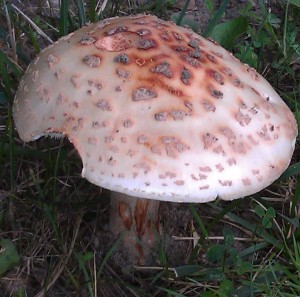Where did the name “compost your phone” come from? 
Can you actually compost your phone?
I’ll speak to both questions, but first…
The idea for this site started with my intention to bring more optimism (and hopefully even more fun!) into the conversations I have with students, friends, and colleagues about environmental issues and sustainability. Despite the best efforts to highlight success stories and to explicitly discuss reasons to be optimistic, studying environmental conservation can sometimes feel overly gloom-and-doom.
“One of the penalties of an ecological education is that one lives alone in a world of wounds. Much of the damage inflicted on land is quite invisible to laymen. An ecologist must either harden his shell and make believe that the consequences of science are none of his business, or he must be the doctor who sees the marks of death in a community that believes itself well and does not want to be told otherwise.”
–Aldo Leopold, A Sand County Almanac
So, what do we do?
I believe we need to continue having the difficult conversations about current environmental challenges—including biodiversity loss at alarming rates, water scarcity, unsustainable extraction of finite resources, the implications of our changing climate for all species on the planet (including us humans), and the contamination of our water, soils, and air by us.
I also believe we should invite the innovative ideas and soak in the enthusiastic descriptions of new crazy-sounding “green” products. Being overly critical of new ideas (to the point of cynicism) is like making faces at your team member during a brainstorming session—nobody wants to be that guy! Letting out (or welcoming in) all the wild ideas—just taking them in and not holding on too tight to any one notion—is how we stumble upon brilliant solutions (and lighten up enough to keep the conversation going).
We’re all guilty of the kind of skepticism and naysaying I’m referring to. I’m guilty of it (but I’m trying to reform). As scientists, we’re trained to be critical, and there’s an important place for that. But now is a turning point in environmental history, and pivotal moments require open minds and an adaptive approach. A willingness to try, to observe, to learn, and then to redirect our energy accordingly.
Where did the name “compost your phone” come from?
In that spirit, we chose the name and URL “compost your phone” because: (1) it feels much more hopeful and fun than “sustainable solutions” or “green living”, and it’s much easier to engage and maintain an open mind in a hopeful conversation & (2) many of our class discussions address the negative consequences of our increasingly disposable technologies, as well as the potential for new technologies to be part of future solutions, so composting cell phones seemed like good imagery!
And, to be completely honest, we landed on the name long before we read anything about attempts to actually compost [your] phones.
Can you actually compost your phone?
As for the possibility of composting your phone, here are a few related stories:
- A team of scientists and engineers in the U.K. has been working to develop biodegradable polymers to produce compostable cell phone cases. And, even better, the cases will have small seeds embedded in them—the seeds only germinate and produce flowers once the case is composted. {read more}
- Several manufacturers have released ‘green phones’ with biodegradable parts (~40% of the casing can be made from corn-based bio-plastic). There are still some components of cell phones that cannot be made from biodegradable or recyclable parts. {read more}
- … But see this story about the emerging technology of biodegradable sugar batteries.
- And read here about Sweden’s ‘Mobile Compost’ initiative to reclaim precious metals (e.g., silver and gold) from discarded cell phones.
You can list a hundred reasons why composting phones is either not possible or not the solution, but let’s not. Let’s just say that right now, today, we cannot compost our old cell phones. But, wouldn’t it be great if we could?
Let’s keep the ideas flowing…
References
Deutsche Welle. (2009, January). ‘Mobile Compost’ project seeks to salvage old phones. Retrieved from http://www.dw.de/mobile-compost-project-seeks-to-salvage-old-phones/a-3942848-1.
Ganapati, P. (2009, August). Spring, Samsung launch biodegradable phone made of corn. Wired. Retrieved from http://www.wired.com/2009/08/samsung-cornphone/.
Leopold, A. (1952). A Sand County Almanac, and Sketches Here and There. Oxford University Press.
Singh, T. (2014, January). Cheap, biodegradable sugar batteries could power batteries within three years. Inhabit. Retrieved from http://inhabitat.com/cheap-biodegradable-sugar-batteries-could-power-gadgets-within-three-years/.
University of Warwich. (2004, November). Researchers compost old mobile phones & turn them into flowers [Press release]. Retrieved from http://www2.warwick.ac.uk/newsandevents/pressreleases/ne1000000097300/.
Written by Jennifer Purrenhage {Editor} | Photos: Jennifer Purrenhage

What special things are you doing for Earth Week?
Personally, my Earth Day began with some indulgent reading of excerpts from Emerson (Nature) and Thoreau (Walden; Walking). I’m also fortunate enough to have my two lectures fall on Earth Day today, so before diving back into our discussion of climate change, I’m sharing some Earth Day history with my classes, including an inspirational quote from Earth Day founder Gaylord Nelson’s address on the 25th Earth Day (in 1995, the same year he was awarded the Presidential Medal of Freedom). And, as soon as my second lecture ends, I’ll be heading home to grab the dog and go walking :).
What about you?
“The opportunity for a gradual but complete break with our destructive environmental history, and a new beginning, is at hand. … We can measure up to the challenge if we have the will to do so—that is the only question. I am optimistic that this generation will have the foresight and the will to begin the task of forging a sustainable society.” –Gaylord Nelson (April 22, 1995)